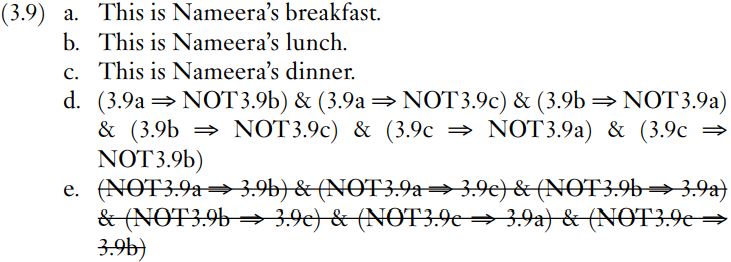
Incompatibility
 المؤلف:
Patrick Griffiths
المؤلف:
Patrick Griffiths
 المصدر:
An Introduction to English Semantics And Pragmatics
المصدر:
An Introduction to English Semantics And Pragmatics
 الجزء والصفحة:
52-3
الجزء والصفحة:
52-3
 12-2-2022
12-2-2022
 1203
1203
Incompatibility
A small hyponym hierarchy is shown in Figure 3.7. There are alternative labels and perhaps even different kinds of meals that could have been included (for example, supper, high tea and brunch), but the ones given will do for present purposes.

Breakfast, lunch and dinner are hyponyms of meal, their immediate superordinate word. Hyponymy guarantees that if we hear that some people had a breakfast in Calais, then we know that they had a meal in Calais, because a breakfast is one kind of meal. However, there is no similarly straight entailment from a sentence with the superordinate – from a sentence containing meal to the corresponding sentence with one of its hyponyms. If we are told that some people had a meal in Calais, we cannot conclude, just from that, that they had breakfast there; it might have been a lunch or a dinner.
What about relations between hyponyms, like breakfast, lunch and dinner? A semantic relation called incompatibility holds between the hyponyms of a given superordinate. Hyponymy is about classification: breakfast, lunch and dinner are kinds of meal. Incompatibility is about contrast: breakfast, lunch and dinner are different from each other within the category of meals; they are eaten at different times of day. The pattern of entailment that provides the test for incompatibility is exemplified in (3.9).

The six entailments in (3.9d) capture the fact that (provided the reference of This stays constant), if one of the sentences (3.9a–c) is true , then the other two sentences – made by substitution of incompatible words – must be false. The scoring through in (3.9e) indicates that a comparable set of entailments is not available from negative versions of sentences (3.9a–c). Knowing that a particular container in the freezer is not Nameera’s breakfast does not allow one to infer that it must be her lunch; it might be her dinner, or my lunch (or even a frozen birthday cake).
 الاكثر قراءة في Semantics
الاكثر قراءة في Semantics
 اخر الاخبار
اخر الاخبار
اخبار العتبة العباسية المقدسة


